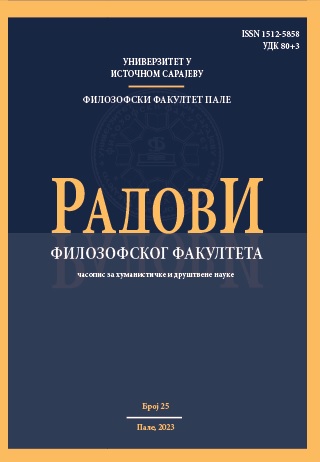ДАНИЦА МАРКОВИЋ - ПРВА СРПСКА МОДЕРНА ПЈЕСНИКИЊА
DANICA MARKOVIĆ - THE FIRST MODERN SERBIAN POETESS
Author(s): Mirjana M. LukićSubject(s): Recent History (1900 till today), Serbian Literature, 19th Century, Theory of Literature, Sociology of Literature
Published by: Универзитет у Источном Сарајеву, Филозофски факултет Пале
Keywords: Serbian Modern poetry; critical reception; love poetry; eroticism; motif of the dead beloved;
Summary/Abstract: The aim of this paper is to highlight the innovations which the poetess Danica Marković (1879–1932) brought to Serbian poetry of the late 19th and early 20th centuries. Special emphasis is placed on the thematic shift in the poetry of this poetess, which is more than evident in comparison to the poetry written by her predecessors and contemporaries (Milica Stojadinović Srpkinja, Jelena Dimitrijević, and Lena Stepanović). In a brief overview, we have reexamined her work in the light of literary criticism, intending to emphasize how Danica Marković's poetry was long regarded as confessional, i.e., autobiographical, which is why sincerity stood out as its main characteristic. The poetess published three books of poetry during her lifetime. The first, titled Trenuci (Moments), was printed in 1904 and immediately gained the favor of literary critics upon its release. Jovan Skerlić, the most influential literary critic of that time, wrote about it, and his critique was surprisingly positive and affirmative. The second book, Trenuci i raspoloženja (Moments and Moods), was published in 1928 by the prestigious publishing house “Srpska književna zadruga.” As is evident from its title, it is a continuation of the first book. A year after the collection’s publication, in 1929 Danica Marković received significant recognition – she was awarded the prize of the Serbian Royal Academy of Sciences and Arts. She was the first woman to be acknowledged by this prestigious institution. However, judging by the number of reviews and critics’ assessments, Danica Marković was already on the path to obscurity. Two years after the publication of the second poetry collection, the third book by Danica Marković appeared under the familiar title – Trenuci i raspoloženja (1930), published at the author’s expense. Literary critics did not pay much attention to this book. It seems that Danica Marković was forgotten even during her lifetime. Until our time, excluding a few adapted texts, Danica Marković’s poetry would be sidelined and branded with the mark of intimate lyricism. Danica Marković brings an authentic voice of a female poet to Serbian modern poetry, writing about the intimate world of women without aversion and with great courage, a quality her predecessors did not express. Expanding the corpus of themes and motifs, this poetess would also be the first in Serbian poetry to invoke the death of a loved one from the perspective of a betrayed and deceived woman. That woman is sometimes vindictive and arrogant, but in her pain, she is always dignified and proud. In her descriptions of love and desire, Marković does not portray a pained and crushed woman, but one who acknowledges and reveals the physical aspect of being. With the same openness, she wrote about love’s disappointments, the loss of vital energy, and the loss of feminine beauty; all when the poetess was only twenty-five years old. Danica Marković, long overlooked and almost forgotten until today, rightfully earned the title of the first Serbian modern poetess through the thematic shift in her poetry, which she fervently penned while escaping life’s hardships.
Journal: Радови Филозофског факултета (часопис за хуманистичке и друштвене науке)
- Issue Year: 2023
- Issue No: 25
- Page Range: 13-33
- Page Count: 21
- Language: Serbian

